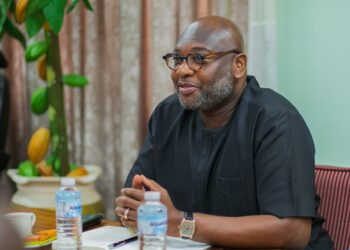The National Commission for Civic Education (NCCE) is spearheading efforts to tackle gender-based violence (GBV) in Ghana, recognising the pivotal role cultural norms play in perpetuating this issue. According to the Ghana Demographic and Health Survey (GDHS), 38% of women aged 15-49 years have experienced physical violence since age 15, whilst 14% have experienced sexual violence.
In a recent interview on Plan B FM’s social and lifestyle programme “Nyansapɔ Fie” with host Odiamono Kwaku Gyimah, Fidel Nii Akuffo Bortey, NCCE Director for Tema West, underscored the importance of challenging and transforming deeply ingrained cultural norms that justify violence against women and girls.
In Ghana, certain cultural practices have contributed to the prevalence of GBV. These include:
Female Genital Mutilation (FGM): a harmful practice that involves the partial or total removal of external female genitalia, often performed without consent or proper medical care.
Trokosi System: a traditional practice where young girls are given to fetish priests or priestesses as a form of atonement for family members’ alleged crimes, often leading to sexual exploitation and abuse.
GBV is a widespread issue globally, rooted in entrenched social norms and power structures. In Ghana, patriarchal societies uphold rigid gender norms, which reinforce the notion that men are entitled to control women and justify violence as a means of asserting dominance. Traditional gender roles, socialisation of gender, and economic factors also contribute to the prevalence of violence.
The NCCE is collaborating with the Domestic Violence and Victim Support Unit (DOVVSU) to equip staff with adequate knowledge on GBV for public education and sensitisation. This includes capacity-building training to effectively address the causes of GBV and promote a culture of respect and equality. The NCCE highlights the importance of:
Education and Awareness: educating communities about GBV and promoting gender equality can help shift societal attitudes.
Legislative Reform: strengthening laws and ensuring their enforcement is crucial in addressing GBV.
Community Engagement: engaging community leaders and members in the fight against GBV can help change cultural norms and promote a culture of non-violence.
The NCCE’s efforts are complemented by organisations such as the International Federation of Women Lawyers (FIDA), which provides legal advice and services to support victims of GBV. The Commission for Human Rights and Administrative Justice (CHRAJ) also plays a vital role in promoting fundamental human rights and addressing GBV. By working together, these organisations can help create a safer and more equitable society for all Ghanaians.
We urge all Ghanaians to join the fight against GBV by reporting cases of violence, supporting victims, and promoting a culture of respect and equality. Together, we can create a society where women and girls can live without fear of violence and exploitation.
By: Longman/Planbfmonline.com










Discussion about this post